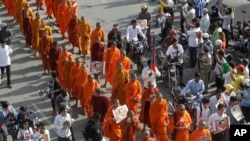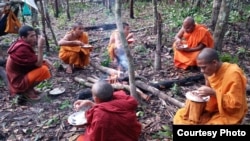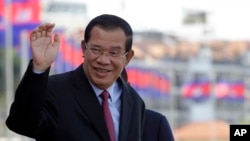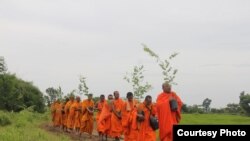Venerable But Buntenh has tried to leave the monkhood three times, but something has always pulled him back from the brink.
In 2013, exhausted by ongoing struggles with the government over his social activism, he even went to the market, bought several shirts and pairs of slacks—the first he had owned since he donned orange robes 18 years ago—and drove to his hometown in rural Siem Reap province. He intended to begin a new life there.
“On the way, I thought that if I leave the monkhood, I will have a wife and kids and have to think about them,” he said.
“If I leave the monkhood, I will need to support myself and my family. I won’t have time to help the nation and the [Buddhist] religion. As a monk, I don’t need to save money for my own life. Whenever I have it, I will help others.”
By the time he arrived in Siem Reap, he had abandoned the plan to disrobe. Two other attempts to leave and start a normal life were equally short-lived.
Buntenh, now 38, has incurred the wrath of the government over the years for his outspoken stance on issues like corruption, land dispossession, and environmental degradation, but he does not seem to be able to stop himself.
Since founding the Independent Monk Network for Social Justice in 2013, he has been at the forefront of multiple public protests about issues affecting Cambodians. His group founded a mobile radio station and spearheaded a multi-pronged campaign to protect Prey Lang forest, among other projects.
Now, however, he is living in indefinite exile in the United States after being charged in January with fraud alongside two other prominent civil society leaders. The three were accused of misappropriating funds collected for the funeral of political analyst Kem Ley, who was assassinated in July 2016.
All three men, as well as Kem Ley’s family, have vehemently denied the accusations, noting that the lawsuit against them came amid a large-scale government crackdown last year that saw many independent media outlets shuttered and NGOs targeted.
The Phnom Penh Municipal Court ordered the men arrested last month, but they had already fled the country separately. Buntenh made his way to the US, where he is being hosted by like-minded Cambodian-Americans in Virginia. He is currently applying for a doctoral program in political economy; if accepted, he might spend the next several years in the US.
Still, he is determined to return to Cambodia eventually, no matter what.
“After finishing my studies, I will go back immediately, and if I am arrested, let’s just say I’ll take a rest for a few years,” he said. “Let’s say I will spend a few years doing meditation in prison.”
From Khmer Rouge Soldier to Anti-Corruption Crusader
But Buntenh was born into a poor family of farmers in Siem Reap province’s rural Varin district. He describes himself as a stubborn, strong-willed child—“a hardliner boy.” With 10 brothers and sisters, there weren’t a lot of resources to go around, so he fought hard to get an education.
After leaving school, he worked briefly as a teacher and census worker, but during the factional fighting between the Cambodian People’s Party (CPP) and Funcinpec in 1997, he fled to the Thai border out of fear, along with some other villagers from Siem Reap. There, he became a soldier and joined a Funcinpec unit along the Thai border.
When Funcinpec was decimated by the CPP and then defeated in the 1998 national election, Buntenh decided to join the Khmer Rouge. That movement was also in tatters as it attempted to defend its last stronghold, Anlong Veng, fighting a doomed guerrilla war against the CPP-led government in Phnom Penh. Still, Buntenh said he had become frustrated by corruption within the ranks of the Funcinpec-aligned military and found the Khmer Rouge a refreshing change of pace. He ended up spending around 10 months living under the command of the famously brutal warlord Ta Mok in Anlong Veng.
“I hate corruption and I thought Pol Pot soldiers were better,” he explained, referring to the longtime Khmer Rouge leader, who died in 1998 after being placed under house arrest by Ta Mok as the movement collapsed amid bloody infighting and internal purges.
“They were corruption-free and against other countries’ invasions [of Cambodia].”
After the last remnants of the former Communist movement were subdued by Hun Sen’s military and Ta Mok was arrested in March 1999, many of Mok’s followers stayed in Anlong Veng and aligned themselves with the CPP. Buntenh became a monk.
Even in his new role, he ran up against corruption at seemingly every juncture. He was assigned to work in the local religion office and as a community educator teaching villagers about HIV prevention, but quit both positions out of anger.
“Because there was a lot of corruption there, I decided to fight against those officials, but I couldn’t win. I was protesting alone and there was a lot of pressure. Therefore, I left,” he said.
“My work was like lightning, a very short time, in various sectors like education, religion, military. [I] never worked for a long time. Whenever there was corruption, I quit immediately.”
Buntenh’s fiery sense of justice and disdain for convention led him to start the Independent Monk Network for Social Justice, even as he became more and more publically critical of the ruling Cambodian People’s Party and its longtime leader, Prime Minister Hun Sen.
“Prime Minister Hun Sen and I are very different, like the distance from the land to the sky,” he said. “Hun Sen likes totalitarianism and I like liberalism. Hun Sen makes corruption and I am against corruption.”
A government spokesman, Phay Siphan, disputed this characterization, echoing other critics who have said that Buntenh crosses the line from a monkish concern with social welfare into outright political campaigning.
“I don’t call him a monk. He just wears monk’s clothes. He is a political activist. His speech is not monk’s words. It is just the language of someone who does politics against Samdech Hun Sen,” he said.
Losing A Job, Gaining a Vocation
Buntenh does not entirely reject that classification. He admits that he openly supported the opposition Cambodia National Rescue Party before its court-mandated dissolution in November. But to his mind, taking a political stand does not contravene the tenets of Buddhism. In fact, he says his religion demands that he support democracy.
“The CNRP tries to create democratic principles, urging people to use the rights to vote for their future. This work, I help. There is no secret,” he explained.
He became more overtly political after an incident that occurred in 2013, shortly after the contentious national election in July that year. He had been working at a university in Phnom Penh, but claims he was fired for posting a video online criticizing the government’s handling of a land rights case.
After that, Buntenh doubled down on his activism and became close to the outspoken political commentator Kem Ley. When Ley was shot dead in July 2016 by a man calling himself “Meet Kill,” the monk traveled to Siem Reap province and tracked down the assassin’s true identity, revealing it on Facebook before any journalists managed to do so.
These days, he is also keeping in touch with his home country through Facebook, a medium whose use he perfected during his years as an activist. From Virginia, still wearing his orange robes, he broadcasts a weekly live-stream on Facebook Live to thousands of viewers, updating them on the political situation in Cambodia and leavening the monologue with a lavish dose of his own opinionated commentary.
When he does manage to return home one day, his goal is to plunge back into activism in some form.
“I want to devote my time and knowledge to help my country,” he said. “I have to come back, even if I am arrested.”
He said he might try to parlay his passion for politics into a career, perhaps as an analyst or adviser to politicians. He is even considering running for office himself one day—in which case he would have to finally take the step of leaving the monkhood and removing his orange robes.
But first, he will have to buy new layman’s clothes. He has gained weight since the last time he contemplated disrobing.
“The ones I bought in 2013 no longer fit,” he said with a laugh.











